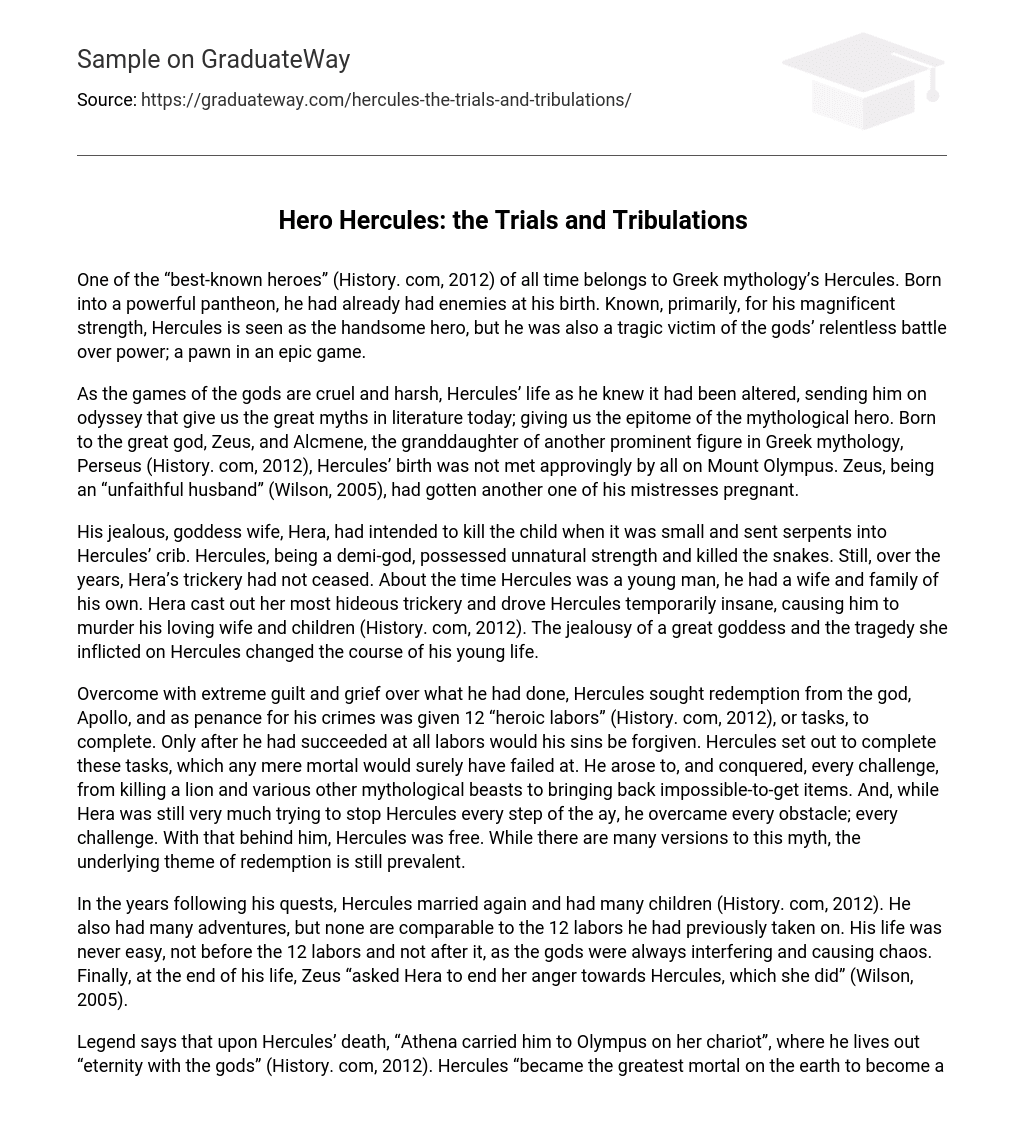According to History.com (2012), Hercules, a prominent figure in Greek mythology, is widely recognized as one of the greatest heroes. Despite being born into a powerful pantheon, he faced adversaries right from his birth. Although he is primarily famous for his immense strength, Hercules is also portrayed as a striking hero who tragically becomes entangled in the gods’ relentless power struggles, ultimately becoming a pawn in their epic game.
Hercules’ life was drastically changed by the cruel and harsh games of the gods, leading him on a journey that resulted in the creation of great myths in literature. He became the ultimate mythological hero, born to Zeus, the great god, and Alcmene, who was the granddaughter of Perseus, another important figure in Greek mythology (History.com, 2012). However, Hercules’ birth was not well-received by everyone on Mount Olympus due to Zeus’ reputation as an “unfaithful husband” (Wilson, 2005). Zeus had impregnated another one of his mistresses.
Hera, the jealous goddess, had planned to kill Hercules when he was a baby by sending snakes into his crib. However, Hercules, being a demi-god, had extraordinary strength and killed the snakes. Despite this, Hera continued to deceive Hercules over time. When Hercules became a young man with a wife and family of his own, Hera used her most terrible trickery and drove him into temporary madness, leading him to unknowingly kill his beloved wife and children (History.com, 2012). The jealousy of a powerful goddess and the tragedy she caused completely altered Hercules’ early life.
Hercules, consumed by a profound sense of guilt and grief for his actions, sought redemption from the deity Apollo. In order to atone for his crimes, he was tasked with completing 12 “heroic labors” (History. com, 2012). Only upon successfully achieving all these labors would his sins be absolved. Despite being deemed impossible for any ordinary mortal, Hercules fearlessly embarked on this journey and triumphed over each challenge. He vanquished mighty beasts of mythology, including a lion, and retrieved unimaginable treasures. Despite Hera’s relentless efforts to impede him, he overcame every obstacle and emerged victorious. Thus, Hercules obtained his freedom. While there are various renditions of this myth, the underlying theme of redemption remains constant.
In the years following his quests, Hercules married again and had many children (History. com, 2012). Despite having many adventures, none of them could compare to the 12 labors he had previously undertaken. His life was constantly plagued with difficulties, both before and after the labors, as the gods were always meddling and creating disorder. At the end of his life, Zeus requested Hera to put an end to her anger towards Hercules, which she did (Wilson, 2005).
According to the legend, when Hercules died, Athena transported him to Olympus on her chariot, where he spends eternity with the gods (History. com, 2012). Hercules, who was fathered by Zeus, achieved the status of a god after being the most outstanding mortal on Earth (Wilson, 2005), and we remember him with great admiration. Like other mythological heroes, Hercules possessed strength and courage and was considered handsome. Despite his divine lineage, he started his missions as a mortal. Many mythological heroes embark on incredible journeys despite being part god.
According to Leeming (1990), heroes in myth are typically “born under unusual circumstances” (p. 218, para. 2) and possess extraordinary strength from birth. Hercules serves as an exemplar of this mythological character. When we think of heroes, we envision individuals who are brave, strong, and larger than life. In the Greek tradition, heroes often have to prove themselves by completing a series of seemingly impossible tasks (Leeming, 1990, p. 274, para. 2). Their journeys and encounters with demons mirror the challenges faced by humanity, including the emotions, struggles, and daily choices between right and wrong.
Hercules’ journey through the underworld and other dark places mirrors the complexity of the human mind. While he had many subsequent adventures, none were as widely documented as his 12 labors. These labors were a path to redemption for Hercules, a way for him to atone for the terrible act of killing his family while under the influence of his evil stepmother. But in general, mythical quests are typically about seeking knowledge and overcoming obstacles. As stated by Leeming (1990, p. 219), these quests are filled with trials and confrontations with our inner demons that ultimately lead to their defeat.
We become fully engaged in the hero’s struggle to ultimately discover ourselves. The hero, Hercules, despite being a half-god and half-man as the offspring of Zeus, was not immune to the jealousy of other gods and goddesses residing on Mount Olympus. Throughout his life, he conquered numerous challenges, showcasing immense strength and courage along the way. Hercules leads us through an unwavering journey of redemption and salvation. As stated by Wilson (2005), “Hercules’ admirable penance and eventual triumph is what distinguishes him.” His legend embodies the quintessential archetype of a mythological hero. Even today, Hercules remains an exemplary mythical figure!





